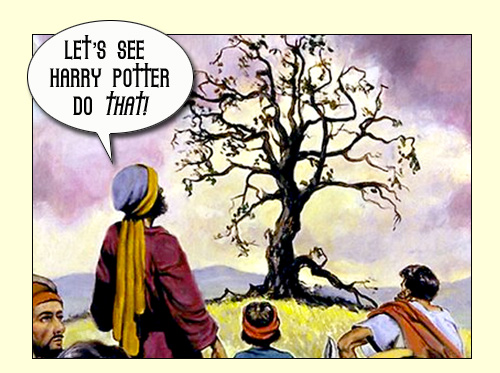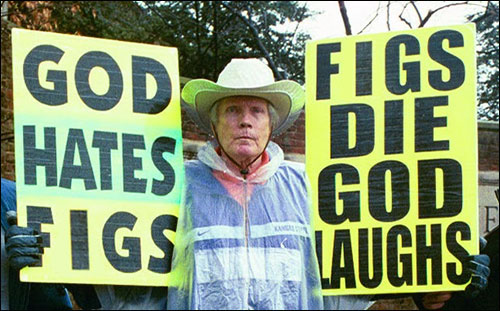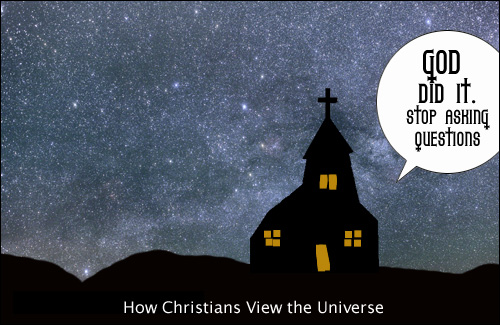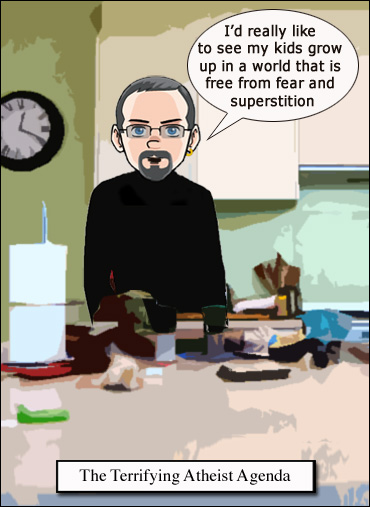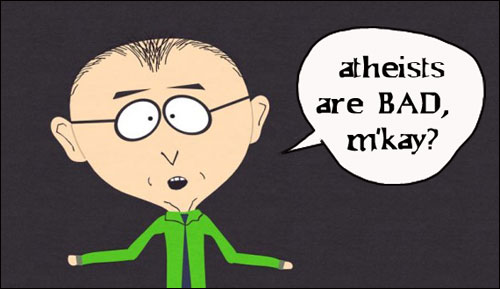[…Deconstructing the Transforming Melbourne document – continued from here. This is the longest post, but also contains the nastiest material. Charitable Christians? Not in this town.]
Their [atheists’] control of major media outlets means they can daily run a crusade for their faith,
Atheists control major media outlets? Wow. That’s news to me. I really wish it were so, but sadly that isn’t the case. And a crusade? Do you even know the root of that word, Mr Isaachsen?
[French croisade and Spanish cruzada, both ultimately from Latin crux, cruc-, cross.]
Any of the military expeditions undertaken by European Christians in the 11th, 12th, and 13th centuries to recover the Holy Land from the Muslims.
Methinks this is a pot-calling-the-kettle-black situation you’ve got going there. I guess you’d have phrased that a little differently if you’d spent more than a nano-second of spittle-flecked-ranting-thought on it.
I’m tired of saying it, but it obviously just doesn’t sink in with people whose brains are ‘wired’ for religion: atheism is NOT A FAITH. It’s not ABOUT faith. It has nothing to do with faith. You can keep on trying to paint it that way, but none of us see it like that. It is a measure of your great failure to understand what we’re talking about that you continue to attempt to portray us as being just like you.
Atheism has become a new “evangelistic religionâ€, seeking to gain converts and stir opposition to Christianity.
No, it hasn’t. Atheists don’t ‘seek to gain converts’. Atheists seek the freedom to let people decide for themselves how the world works without influencing them with superstition. If you had real faith that what you believe is right, Mr Isaachsen, surely this shouldn’t concern you quite so much.
This new religion calls for adherents to a level of faith to believe that there is no meaning in life, there is no God, and that the only “real†things are those you can touch or prove. To believe anything else would be illogical (what they do about proving or disproving “love†is a mystery).
OK, well, now it’s obvious that he’s just raving. Atheism, as I keep saying, is not a religion and does not involve faith. And it certainly isn’t new, any way you want to look at it. And notice how he folds a whole lot of puerile and simplistic assertions up together and presents them as if they are one wholistic fact. Although atheists don’t feel the need to believe in a supernatural being that takes a personal interest in our affairs (we don’t believe in God – fact), I don’t know a single atheist or humanist who says that ‘there is no meaning in life’, or that ‘the only real things are those you can touch or prove.’ These are gross misrepresentations of an atheist viewpoint, and Mr Isaachsen undertakes them out of wilful malice or ignorance. I am inclined toward the former, given the tone of his tract.
I won’t even bother with his silly faux puzzlement about ‘proving’ or ‘disproving’ love. I can’t even fathom a brain that thinks with such superficial banality.
The promoters of this “religion†are strong on seeking to undermine Christianity and religion, and are engaged in widespread attempts to have the core values of our society removed.
While Mr Isaachsen is very happy to promote atheism as a religion here, I wonder how keen he’d be to see it get the kinds of tax breaks that his Church does? Not very, I wager. Like many religious people, especially Christian religious people, he seems to see atheism as some kind of anarchistic form of Satanism. No atheist in my sphere of knowledge is attempting to ‘have the core values of our society removed’. It’s fearful and hyperbolic language designed to frighten people who don’t know better. You see, what he’s doing here is saying that Christianity has some kind of monopoly on all the things we consider good and valuable in our society, and that those kinds of values simply can’t come from anywhere else. Any reasonable person would realise, after a moment of reflection, that many, many societies through history have managed to have very decent lives without even having heard of the Christian religion. This frightening hubris is extraordinary, given the widely promoted emphasis on meekness and humility within Christian philosophy. This idea that Christianity is the be-all and end-all of how to live a life is far from meek or humble. ((The exhortations of meekness and humility are of course just rhetoric. Christians throughout history have displayed arrogance, aggression and hubris in staggering quantities whenever it suited their purposes. The Catholic Church – meek and humble? Give me a break!))
An example is their moves to undermine the traditional nature of family based of the marriage of a man and a woman and the children they bear and raise, which is the core of a healthy society.
Ah, there we have it. Where is that Christian tolerance now? Since you’re bashing gays, Mr Isaachsen, why not throw in a couple of stonings and a sacrifice? They come from the same part of the Bible. Or can you, like so many Christians, somehow manage to live your life by the bits of the Bible that suit you and ignore the rest?
They are strong on their style of intellectualism and highly intentional at gaining influence and pulling down religion (and especially Christian faith). It is noticeable that there is little mention of promoting positive contribution to society or of any initiatives or encouragement towards the welfare of our society. (It is recently rumored that atheists have started an overseas child sponsorship programme – perhaps to be able to say they have an interest in welfare programmes.)
I really find it hard to believe that this man is quite as stupid or malicious as he appears. What is that last sentence? A condescending attempt to give an impression there is only ONE non-religious charity out there?! Is he really that small-minded? (That’s mostly a rhetorical question, because I actually think he is.)
The Atheists claim they focus on pursuing the truth, however in publicly attacking the Chaplaincy in schools programme as being negative and for preaching and brainwashing children they deliberately or otherwise deny the truth, and certainly do not reveal how highly valued chaplains are by principals and school that work with them, and the growing number of principals applying to have a chaplain at their school.
OK. Well. That’s incoherent.
On receiving the Australian Foundation of Atheists “Australian Humanist of the Year†award, Dr Leslie Cannold urged her audience to organise and fight back against religious fundamentalists who take advantage of Australia’s acceptance of religious freedom to push their ”violently intolerant ideologies’
Oh right, so what you’re saying then, Mr Isaachsen, is that we should condone religious fundamentalists? Like the ones who flew planes into the World Trade Center, perhaps? And you, by chance, advocating violently tolerant ideologies? Because it sure sounds that way…
She went on to make the extraordinary claim that “Christianity is a greater threat to society that militant Islamâ€.
No, she did not (evidently Christians have no compunction about lying as part of their modus operandi, just as I inferred last post). What Dr Cannold said, in fact, was:
My point here is not to suggest that [proselytizing] is not morally repugnant and a real cause for alarm – it is – but to point out that in Australia the risks it poses emanate primarily from evangelical Christian fundamentalists, not jihadist Muslims.
… which is a very different proposition entirely. She is saying, in case I need to make it clear, that religious proselytizing by evangelical Christian fundamentalists is of greater concern in Australia than proselytizing from fundamentalist Muslims. I’m pretty sure that a great number of Australians would agree with that statement.
Mr Isaachsen either didn’t read Dr Cannold’s speech, or he is intentionally altering its meaning to suit his purpose. Either way he is being deceitful. ((It is possible that he just wasn’t capable of understanding what she was talking about. It wouldn’t surprise me.))
Where would it lead if they had their way?
“The attempt to eradicate religion only leads to it reappearing in grotesque and degraded forms. A credulous belief in world revolution, universal democracy or the occult powers of mobile phones is more offensive to reason than the mysteries of religion, and less likely to survive in years to come.†~ ‘Evangelical atheism, secular Christianity’ By John Gray – Emeritus Professor of European Thought at the London School of Economics
That has to be the lamest quote in support of an argument that I’ve heard in a very long time. Mr Isaachsen conveniently forgets that Christian history is littered with its (often successful) efforts to eradicate religions with which it has come into conflict. Didn’t seem to be much of a problem when the Christians were hell bent on doing it. As usual, the double standard is in play, bolstered by the haughty Christian conviction that they have the monopoly on a superior morality and spirituality. Mr Isaachsen seems oblivious of the fact that Professor Gray’s quip says, in effect, that ANY religion is better than no religion at all. Christians (including Rob Isaachsen if this tract is an accurate representation of his stance) quite plainly are only prepared to tolerate ONE religion: their own.
It seems clear that if they were to succeed with the atheist’s intentions, the society based on their philosophy would lead to a collapse of much of what we know and enjoy, what is valued by the majority of the population, and what sustains much of the community.
It doesn’t seem at all clear to any thinking person that this apocalyptic scenario would unfold, Mr Isaachsen. You seem once again to have gotten your atheists confused with your anarchists (or perhaps with your Satanists). And once again you seem to think that Christianity is responsible for everything good about our lives and ‘much of what we know and enjoy’. That’s plain bunk. Personally speaking, I have a very enjoyable, love-filled, friend-rich, family-oriented life full of wonder, and inspiration and satisfaction. And, as much as this seems an impossible thing for you to grasp, not one little bit of it is due to Christianity. Or ANY religion. That is purely a conceit of your limited world view.
CONCLUSION
Secularisation involves doing churchy things in a churchy way by non-churchy people, and while this has resulted in decades of marginalization of the church, it is now recognized that a very obvious partner for governments in the church-type activities is the church itself.
Wow. That ace came off the bottom of the deck so fast that I wonder how many of you saw it? Rob Isaachsen just tried to claim all the commendable acts in the world in the name of the Church! Apparently he believes that there can be no kind of admirable morality without it being somehow the responsibility of religion! How offensive is that? Every doctor in Médecins Sans Frontières, every volunteer for Amnesty International, every one of you who has done something out of human compassion or altruism is just doing a ‘churchy thing’. In fact, your churchy thing, dear Acowlyte, was a lesser deed because it didn’t involve Jesus. What a mean-spirited and selfish philosophy this man holds. If this thinking represents the thoughts of most Christians, then they have every reason in the world to be afraid of atheists and humanists because their shallow morality must inevitably unravel in the face of people who really care.
I’m going to finish this up here, faithful Cowpokes. The Transforming Melbourne diatribe goes on for a while more, but I am sincerely offended, no – disgusted, by the imperious self-righteousness that saturates it, and I don’t care to dismantle it any further. Since I left the Christian Church 35 years ago as a teenager, I have never really been fond of its myopic and outmoded approach, but this new evangelism, fuelled as it is by fear and desperation, stinks of a witch hunt. Which, after all, is a pursuit with which Christianity is very familiar.
